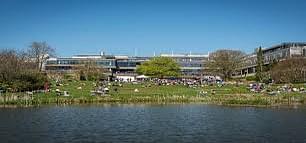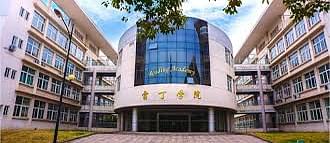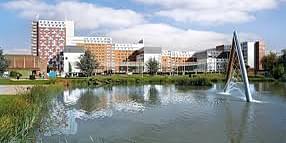Master (International Relations with International Law)
Field of Study:
₹20.8 L/Yr
Tuition Fees
| Year | 1st Year Fees |
|---|---|
| Tuition Fees | ₹2076480 (GBP 18000) |
At the School of Physical Sciences, we have a strong teaching record in analytical chemistry and we are proud to link our world-leading research on materials chemistry to our undergraduate programmes. All practical classes take place in our newly refurbished laboratories, where you use the latest equipment.
This programme is fully accredited by the Royal Society of ChemistryÊ(RSC).
Our degree programme
Chemistry at Kent is a distinctive programme and includes a set of Ôchemistry in contextÕ modules where you apply your knowledge to specific case studies. For example, in our first-year Disasters module, you choose a chemical disaster and use your understanding of chemical phenomenon to formulate a disaster management plan.
Your first year modules introduce you to the broad base of knowledge on which chemistry is founded. In your second year, you further develop your knowledge of organic, inorganic and physical chemistry and improve your practical laboratory skills.
In your third year, alongside compulsory modules you can choose to take a module focusing on DNA analysis or fires and explosions. You also complete an advanced project in which you gain experience of advanced laboratory techniques and produce a short research project.
In your final year, you complete either an experimental or computational research project, which you choose from our project list. You work with an academic supervisor as part of their research team gaining invaluable practical experience as well as an understanding of the challenges and rewards of extending knowledge in your field.
BSc programme
You also have the option of doing a three-year BSc degree. For details, see Chemistry. It is possible to take the BSc with a placement year and gain valuable work experience. For details, see Chemistry with a Year in Industry.
Foundation year
If you do not have the grades you need to study on our BSc degree, you could take Chemistry with a Foundation year.
Study resources
We recently invested £10 million in our laboratories and improved our general study spaces. Facilities to support chemistry include a full characterisation suite for materials containing:
- three powder diffractometers
- a crystal diffractometer
- X-ray fluorescence
- instruments to measure magnetic and transport properties at 4K and up to 7 T
- a Raman spectrometer
- two scanning electron microscopes (SEM)
- gas chromatographyÐmass spectrometry (GC-MS)
- high-performance liquid chromatography (HPLC) system
- atomic absorption spectrometry (AAS) equipment
- Fourier transform infrared spectrometerÊ(FTIR).
Extra activities
The School of Physical Sciences is home to an international scientific community of chemistry, forensic science, physics and astronomy students. Numerous formal and informal opportunities for discussion make it easy to participate in the academic life of the School. All students have an academic adviser and we also run a peer mentoring scheme.
You are encouraged to participate in conferences and professional events to build up your knowledge of the science community and enhance your professional development. The School also works collaboratively with business partners, which allows you to see how our research influences current practice.
You can also take part in:
- the SchoolÕs Physical Sciences Colloquia, a popular series of talks given by internal and external experts on relevant and current topics
- the student-run chemistry society, Chemsoc, which organises talks with top industry professionals, practical demonstrations and social events.
Independent rankings
Chemistry at Kent was ranked 8th for course satisfaction in The Guardian University Guide 2018.
In the National Student Survey 2017, over 89% of final-year Chemistry students were satisfied with the overall quality of their course.Ê


Do you think the Rankings are wrong ? Report Here
TOP Scholarships
| Scholarship name | Award amount | Eligibility |
|---|---|---|
| - | - | - |
| - | - | - |
| - | - | - |
Key Resources for Your Study Abroad Journey
Course Guides
Executive MBA in UK: Top Colleges, Admissions, Fees, Funding, Scope
Masters (MS) in UK: Top Universities, Fees, Requirements & Deadlines
Masters in Law (LLM) in UK: Fees 2023, Top Colleges, Placement and salaries
Masters in Management in UK: Fees 2023, Top Colleges, Placements & Salaries
Scholarship Grants & Financial Aids
| Name | Scholarship Per Student | Level of Study | Type | |
|---|---|---|---|---|
| GREAT Scholarship | Scholarship per student₹ 14.4 L/Yr$12,499 | Level Of StudyMaster | TypeCollege-Specific | |
| BrokerFish International student scholarship | Scholarship per student₹ 1.2 L/Yr$1,000 | Level Of StudyBachelor | TypeMerit-Based | |
| UWL International Ambassador Scholarship | Scholarship per student₹ 7.4 L/Yr$6,447 | Level Of StudyBachelor | TypeCollege-Specific | |
| Gyandhan Scholarship | Scholarship per student₹ 1.4 L/Yr$1,222 | Level Of StudyMaster | TypeMerit-Based | |
| QS scholarships | Scholarship per studentVariable Amount | Level Of StudyBachelor | TypeMerit-Based | |
| Bharat Petroleum Scholarship 2020 | Scholarship per studentVariable Amount | Level Of StudyMaster | TypeMerit-Based |
Similar Colleges


Robert Gordon University


University of Aberdeen


Aberystwyth University


University of Bath


Cranfield University


Queen's University Belfast


Ulster University


University of Reading

























Comments